Posts Tagged ‘VCs’
182 From Unicorn Companies To Camels w/ Matthew Cowan, Next47 Venture Capitalist
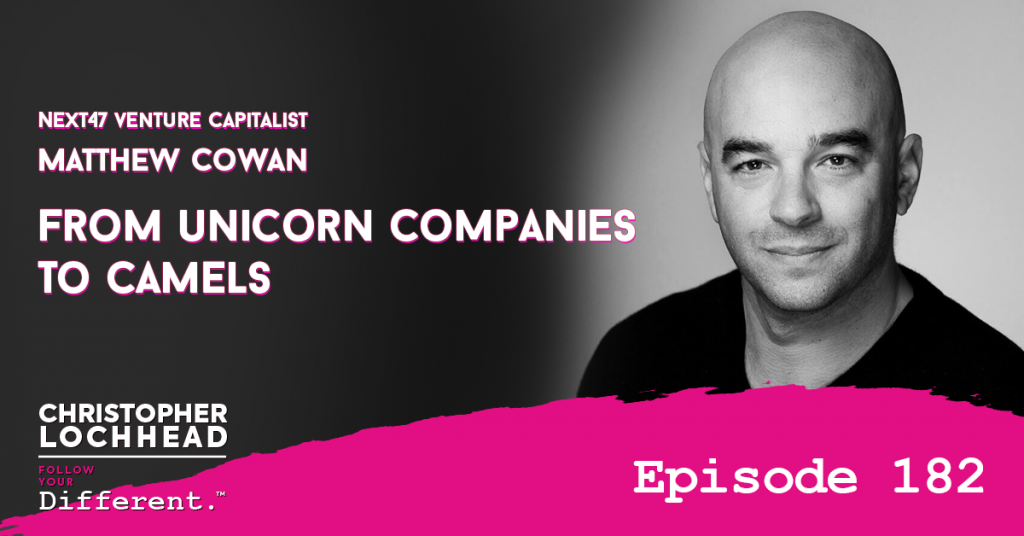
Podcast: Play in new window | Download (Duration: 55:58 — 38.4MB) | Embed
Subscribe: Apple Podcasts | Spotify | Pandora | RSS | More
Today, we have none other than Matthew Cowan of Next47. Matthew and Chris have known each other for almost 20 years now. He’s been both an investor and an entrepreneur and has invested in a lot of category queens and kings companies.
In this episode, we have a wide-ranging conversation with Matthew about venture capital, entrepreneurship, and a whole lot more.
How The Future Looks Like
Matthew shares that the first question we have to take into consideration is with respect to opportunities. Every evaluation should start with the question: can businesses scale and grow in the current economic environment?
He cites his company as an example, Visible, a platform that has an event management software. Prior to Covid19, they had their fair share of challenges. However, they found themselves on the positive side of this “new normal” as most companies shifted their conferences and events virtually.
“All of our customers said, ‘look, I know we can’t do these events in person, we still have to do these events. These are mission-critical for our customer relationships, and our forward progress. So we need you to help us figure out how to do events in a virtual construct.’ So very quickly Visible figured out a way to deliver you know, near term and experience that satisfies, you know, the key market requirements, and they just closed their best quarter ever by a factor of two x.” – Matthew Cowan
Invest In Product Development
Today is a great time for investors to think about the early stages of a new product. Further, Matthew says this is a good time to invest in a team of engineers, lock them in, and come out with a new product to launch. He further shares why this stage of focus is critical for businesses.
“It’s okay to lose a lot of money building a company you have to, but if your unit economics have never been positive, the only metric you’re going to do is figure out how fast you can burn cash.” – Matthew Cowan
The Wrong and Right Way In Investing
Chris cites that there is a wrong and the right way in investing. Obviously the right way is investing in things that hopefully payoff overtime and the wrong way is in unit economics that will not be fixed. Matthew agrees to Chris saying that the greater fool theory is asking: “how do I just get this to the next level and get someone else to buy it — market investors, private equity firms, and others.
“I think we’re at the beginning of what’s going to be an incredible wave of continued consolidation. We’ll probably see that with the scooter companies, as well. Ride-sharing. Companies have to figure out how to create, you know, improve utilization. The way that these businesses could succeed is delivery, density, and utilization. For them to figure out a way to keep the cars full.” – Matthew Cowan on Uber
To know more about Matthew Cowan and unicorn and camel VCs, download and listen to this episode.
Bio:
Matthew joined Next47 in 2018 and is based in Palo Alto. His investment focus runs the gamut from the high-growth supply and logistics market to vertical software applications for the enterprise.
Though Matthew is a General Partner in the U.S., he also leads the firm’s activities in Israel and views the region as a vital source for deep tech startup activity.
Before joining Next47, Matthew was the CEO and co-founder of Breezeworks, a mobile CRM platform for small business owners.
Prior to Breezeworks, he was the co-founder of Bridgescale Partners, a late-stage venture capital fund with investments in companies such as BitGo, Jasper Wireless, Plum Organics and Proofpoint.
Matthew was also the founding General Partner of Bowman Capital’s venture capital group, where he was responsible for leading investments in Arrowpoint Communications (sold to Cisco), Atheros (NASDAQ: ATHR), Broadbase (sold to Kana), epinions (sold to eBay), FastForward Networks (sold to Inktomi), Onebox (sold to Phone.com), ONI Systems (sold to Ciena), RemarQ (sold to Critical Path), SupportSoft (NASDAQ: SPRT), Sycamore Networks (NASDAQ: SCMR) and The Street.com (NASDAQ: TSCM).
Matthew spent the earlier part of his career at Intel Corporation, where he was responsible for investments in CMGI (NASDAQ: CMGI), CNET (sold to CBS), Geocities (sold to Yahoo!), Illustra (sold to Informix), iVillage (sold to NBC), Launch Media (sold to Yahoo!), Liquid Audio and Sportsline, among others.
Matthew holds a BA from Tufts University.
Links:
We hope you enjoyed this episode of Follow Your Different™! Christopher loves hearing from his listeners. Feel free to email him, connect on Facebook, Twitter, Instagram, and subscribe on iTunes! Get amazing, different stories on business, marketing, and life. Subscribe to our newsletter The Difference.
175 The Startup Community Way w/ Brad Feld
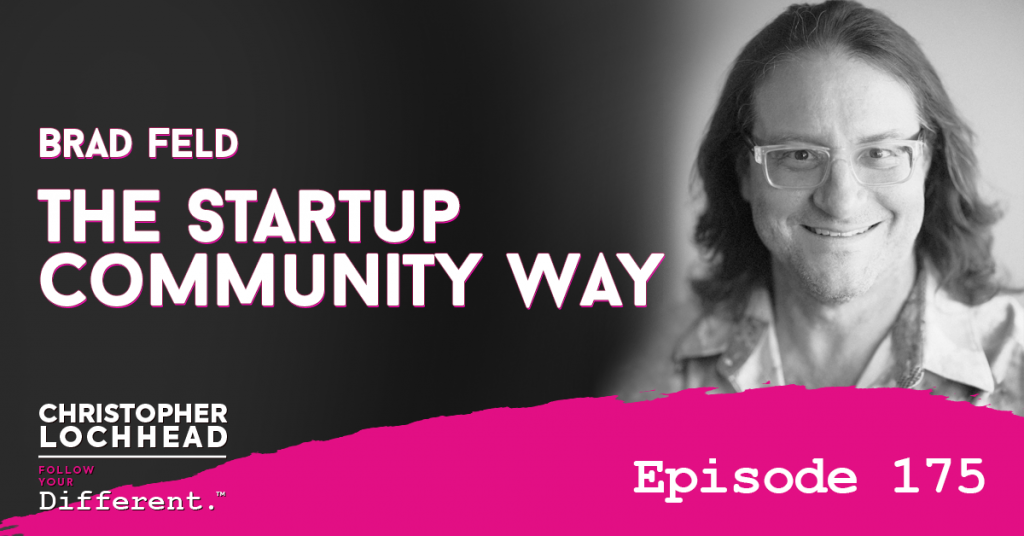
Podcast: Play in new window | Download (Duration: 1:10:44 — 48.6MB) | Embed
Subscribe: Apple Podcasts | Spotify | Pandora | RSS | More
Today, we continue our run on top venture capitalists with none other than the legend, Brad Feld. He’s the co-founder of Foundry Group and Tech Stars. He’s on the Forbes Midas List and a Top Five Investor. He has a new book called The Startup Community Way.
We have wide-ranging conversations from C19, making sense of this time of hyper change complex adaptive systems, the future of startups Silicon Valley and work, and why Brad is not leaving his house. Pay special attention to Brad’s thoughts on how to deal with an unpredicted situation and where it can feel like we have a lot less control.
The Three Crises
Brad shares what’s on his mind at the moment, how he has stepped forward to help the governor of Colorado without leaving the confines of his home, and how he has pondered upon the three crises of the world today.
“I referred to the health crisis, which is COVID, which generated an economic crisis, which we wouldn’t have had otherwise, our economy was very strong, which has generated a mental health crisis and which is subsequently generated. racial equity crisis. All of these things are interacting with each other.” – Brad Feld
Complex Adaptive Systems
Brad shares how he realized that all of these crises were complex systems. In fact, in his book, The Startup Community Way, he bases the entire framework of how startup communities develop and evolve on complexity theory and the notion of complex adaptive systems.
“I’ve really been soaked in that intellectually, not just in the COVID crisis, not just in the book, not just in all the dynamics around the businesses that I’m involved in, and I’m an investor in, but just sort of thinking about how as humans, we do such a bad job of understanding how to interact with complex systems. We want everything to become deterministic, linear or well defined and the vast majority of stuff we interact with isn’t.” – Brad Feld
Simple and Complex Systems
Simple is making a coffee drink, complicated is designing a Boeing airplane, or conducting a business audit, and complex is raising a child.
“I think a lot of people have been operating against the backdrop of believing that a lot of things are deterministic and predictive, and trying to function in a way where that is not natural. As humans, we want to control stuff. You want to understand what it is you want to do, fix things so that you’re not fighting against them and you want to get to an outcome and you want to set a goal and make a goal.” – Brad Feld
To know more about Brad Feld, download and listen to this episode.
Bio:
Brad Feld is co-founder of the Foundry Group and has been an early-stage investor and entrepreneur since 1987.
Brad previously co-founded Mobius Venture Capital and Techstars, and prior to that, founded Intensity Ventures.
Feld was an early investor in Harmonix, Zynga, MakerBot, and Fitbit.
A writer and speaker on venture capital investing and entrepreneurship, Brad has written a number of books as part of the Startup Revolution series, and writes the blogs Feld Thoughts and Venture Deals.
He currently is chair of the National Center for Women & Information Technology and on the boards of Path Forward, the Kauffman Fellows, and Defy Ventures.
Brad holds a Bachelor of Science and Master of Science degrees in Management Science from MIT.
An art collector and long-distance runner, he has completed 25 marathons as part of his mission to finish a marathon in each of the 50 U.S. states. He lives in Boulder, Colorado.
Links:
The Foundry Group Team – Brad Feld
We hope you enjoyed this episode of Follow Your Different™! Christopher loves hearing from his listeners. Feel free to email him, connect on Facebook, Twitter, Instagram, and subscribe on iTunes!
139 World Without Waste w/ Steve Pratt CEO of AI Startup Noodle
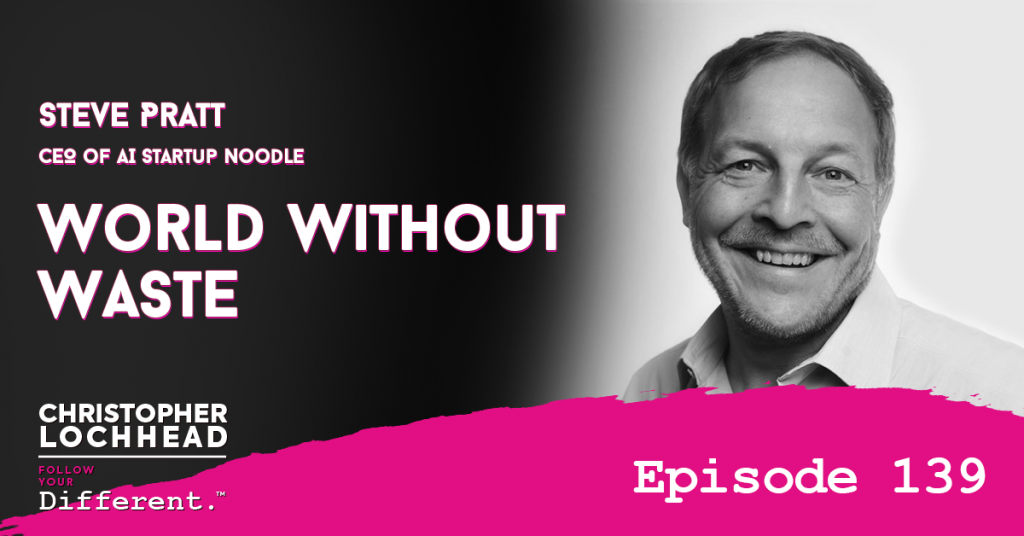
Podcast: Play in new window | Download (Duration: 59:58 — 82.7MB) | Embed
Subscribe: Apple Podcasts | Spotify | Pandora | RSS | More
This is our second in our two-part series on Digital Business, with Steve Pratt, CEO of Noodle.AI, the remarkable startup on a mission to changing global manufacturing and supply chain business.
We have a real conversation about how the combination of Machine Learning / AI, The Cloud, IoT and deep data analytics can come together to reduce both economic and environmental waste.
In case you missed the first part of this two-part series with Business Guru Big Ben Rewis, check it out: Episode 138.
Missionary CEO
Christopher has known Steve for over 30 years. He has a vast and impressive experience in digital marketing, starting with the creation of CRM business for Deloitte. He was also the founder and CEO of the InfoSys Consulting Practice and he also led IBM Watson’s initiatives.
Steve has deep experience in building and managing massively successful, deep technology businesses. He has some powerful insights, through his company Noodle.Ai, into how modern technology can reduce economic and environmental waste. This is what Christopher calls a great example of a missionary CEO, where the E stands for Evangelist.
“The intention of the company is to apply data science to create a world without waste. We reject this notion, historically, that you had to choose between profits and the planet.” – Steve Pratt
World Without Waste
Steve shares how companies have scaled things right now. They have created amazing hyper-growth for their companies, but have also accumulated huge amounts of waste.
“We have over 500 billion dollars of excess inventories sitting in warehouses. We got 50% of trucks driving around, empty. We have about 400B dollar of stuff, that is thrown out in the manufacturing process because of quality defects. These are all preventable.” – Steve Pratt
A lot of people analyzed where the waste is in the world and over 90% of the waste in the world is due to manufacturing and logistics. Steve points out that due to bad computations, companies are manufacturing trillion dollars of goods and let it sit in their storage, because they couldnt get it out to the market.
Environmental Sustainability
Steve shares about steel manufacturing company Big River Steel, which they granted a lead certification for environment sustainability.
“With our applications, that consumption to reduce inventory levels, reduce quality defects and they are the most profitable, per employee, the highest profit per mil hour, the lowest environmental impact of any steel known in the world.” – Steve Pratt
Christopher and Steve then discussed that companies should analyze data that is readily available to them. This is can easily be achieved through the help of various technologies available.
To hear more about how digital businesses can achieve a world without waste and other insights of Steve, download and listen to this episode.
Bio:
Stephen is an instigator, agitator, and pioneer in creating world-class technology services organizations.
He has spent his career building innovative ways to create value for the world’s most important organizations.
Prior to Noodle, he was responsible for all Watson implementations worldwide for IBM Global Business Services.
He also was the founder and CEO of Infosys Consulting, a Senior Partner at Deloitte Consulting, and a technology and strategy consultant at Booz, Allen & Hamilton.
He twice has been selected as one of the top 25 consultants in the world by Consulting Magazine.
He has Bachelors and Masters degrees in Electrical Engineering from Northwestern University and The George Washington University focused on Satellite Communications.
For fun, Steve plays competitive tennis, races sailboats, and formerly was a crazed rugby player. He enjoys playing acoustic guitar for his children (not ready for prime time).
Links:
We hope you enjoyed this episode of Follow Your Different™! Christopher loves hearing from his listeners. Feel free to email him, connect on Facebook, Twitter, Instagram and subscribe on iTunes!
138 Digital Business Guru Big Ben Rewis
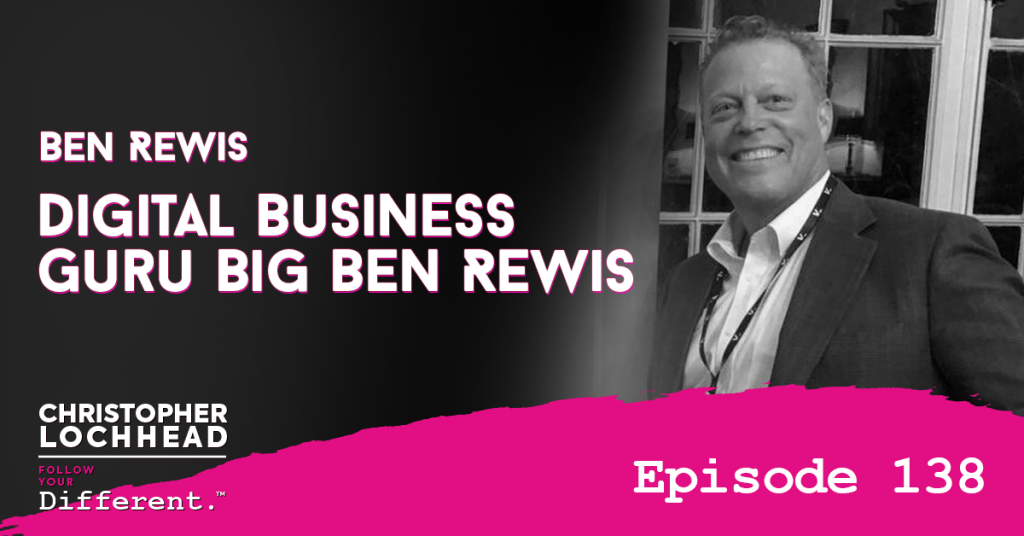
Podcast: Play in new window | Download (Duration: 1:05:16 — 149.7MB) | Embed
Subscribe: Apple Podcasts | Spotify | Pandora | RSS | More
This is our first in a special two-part series on Digital Business. The legendary Big Ben Rewis joins us today to have a real, powerful conversation about digital businesses today and how big data can contribute to sustainability.
In our next episode, watch out for Steve Pratt CEO of Noodle.AI, the remarkable startup changing global supply chains.
Surfer, Snowboard, Advisor
Big Ben is one of the most extraordinary adventure athlete’s of this time. He is a skier, snowboarder, sailor, and surfer. In fact, one of his first few sponsors were Jake Burton, the founder of Burton Snowboards.
Today, when he’s not surfing or on some kind of adventure, Ben Rewis would most likely be dishing digital business advice to Fortune 100 companies and startups in Silicon Valley. He has deep experience in building and managing massively scalable digital business and payments infrastructure.
Digital Business Guru
Just to name a few of Ben’s contributions, he created the Internet e-Commerce team for Visa. He was also Head of Security & Fraud Technology for First Data and he’s an advisor to a startup Verdant Robotics, a startup doing amazing things with AI & Machine Learning in the smart agriculture category.
“I think there’s a lot of themes, there’s a lot of organizational and technical similarity across all of them. The whole notion of data in the digital business is just fascinating, what’s happening in the industry today. Cause you know, like the industry quote ‘software is eating the world.’” – Ben Rewis
Digital Business is the Future
Digital businesses are not brand new, as they have been around a long time.Ben now shares that people are realizing the by-product of their digital business can infect more businesses.
“Digital businesses don’t necessarily have new value-added services that are data-based. They may have a legacy product or service, that is digital and they realizing that the data that is produced by that service can help them generate new revenues, or cut costs.” – Ben Rewis
To hear more about how digital businesses can greatly influence sustainability efforts for the future and other insights of Ben, download and listen to this episode.
Bio:
Ben Rewis was raised in New England north of Boston, the eldest son of two high school teachers.
After graduation from The Stowe School in VT., he moved to San Francisco, CA at age 17 and have been in technology ever since.
Today, he’s an advisory consultant to startup CEOs, and a deep payments expert with solid leadership and innovation skills.
Facilitator, speaker, communicator, thinker and doer, able to bring different constituencies together around a common digital business vision and set of deliverables.
Able to drive from big picture down to concrete initiatives. Passionate about helping teams solve challenges for strategic alignment.
In addition to his business involvement with major companies, he has decades of wilderness and group leadership experience, becoming an Outward Bound instructor at age 21, and taking part in numerous adventure expeditions around the world.
He’s crossed deserts and canyons, sailed the Tasman Sea, and climbed mountains like McKinley.
He enjoys just about all board sports, competed in the first world championships for snowboarding, and learned to surf at age 40.
Ben co-founded the Drop In Coalition, and is an Advisory Board Member of the Save The Waves Coalition, and was honored in 2019 as a Royal Geographic Society Fellow.
Links:
We hope you enjoyed this episode of Follow Your Different™! Christopher loves hearing from his listeners. Feel free to email him, connect on Facebook, Twitter, Instagram and subscribe on iTunes!
131 How to Build Billion Dollar Startups w/ David Sacks
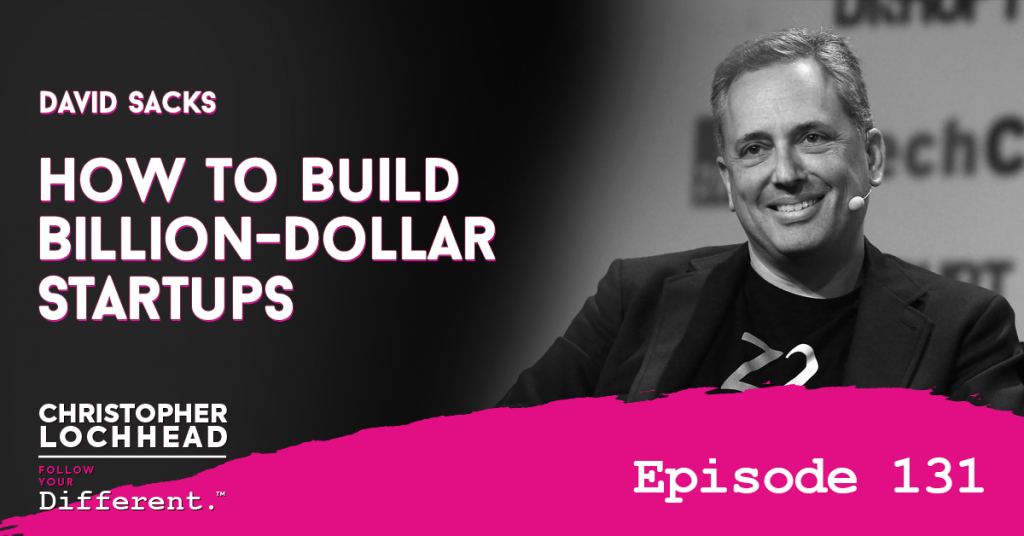
Podcast: Play in new window | Download (Duration: 1:00:03 — 82.7MB) | Embed
Subscribe: Apple Podcasts | Spotify | Pandora | RSS | More
In this episode, we have a real conversation about legendary entrepreneurs and investor David Sacks about how to build billion-dollar startups.
We talk about how startups go off the rails and what is ok and not ok to lose money on. We also touch on why B2C strategies have become powerful for B2B companies and many more! If you’re an executive or an entrepreneur, even if you’re outside of tech, get your pen ready. there’s a ton on this episode!
Legendary VC
We continue our run of legendary VCsc with David Sacks. He was a co-founder of PayPal, Founder, and CEO of Yammer and Founder of Craft Ventures. Some of his investments include Facebook, Uber, SpaceX, Palantir Technologies, Airbnb and Bird
This is another great example of the power of a real dialogue podcast.
“You know the old line of ‘nobody ever got fired for buying IBM’? I think that the modern version of that saying would be ‘no one ever got fired for buying the category leader’ and if you become the category leader, you just get all these sales by default.” – David Sacks
Going Off The Rails
David shares how he witnessed high profile companies going off the rails for several reasons. He noted that aside from product-market fit, there are other mundane reasons why these companies fail. Here’s the big list that could go wrong in high growth companies:
“One is commoditization, the rest of the world catches up the startups innovation. Two, cost of customer acquisition, a bunch of reasons it could happen. Third, margin problem, negative gross margins. Fourth, external dependency. Fifth, leaky bucket, there’s a problem with retaining customers. Sixth, regulatory compliance, then, sales compliance problem, that’s seven. Eight, doing things that don’t scale. Nine would be the founder psychology problem which is pushing things too far and tenth, company culture problem. One the 10.1 mark, macro shock where the company goes out for financing and isn’t able to raise around because of one of the problems I mentioned in them. Everything comes to head and you had a car crash.” – David Sacks
The Challenge for Startups
One of the greatest fears of startups Is commoditization. David says there is always a risk of the competition catching up in terms of software design. He encourages startups that it is a trade-off to make, to move fast enough to maintain market leadership.
“Everyone is running around with their hair on fire but they’re afraid that their innovation gets copied. If you’re not moving fast enough, you’re on a bit of hamster wheel. If you’re not moving fast enough, you’re running in place.” – David Sacks
To hear about David’s thoughts on how to define and dominate a market category, what areas of technology David thinks have the most promise and more, download and listen to this episode.
Bio:
David Sacks is a highly accomplished entrepreneur and investor in internet technology firms.
He is general partner of Craft Ventures, a venture capital fund he co-founded in late 2017. Previously as an entrepreneur, Sacks was the founding COO and product leader of PayPal (acquired by eBay in 2002 for $1.5 billion) and Founder/CEO of Yammer (acquired by Microsoft in 2012 for $1.2 billion).
In 2016, he led the turnaround of Zenefits as interim CEO.
In 2017, Sacks co-founded blockchain startup Harbor as an incubation of Craft Ventures.
His angel investments include Facebook, Uber, SpaceX, Palantir Technologies, Airbnb and Houzz.
Links:
We hope you enjoyed this episode of Follow Your Different™! Christopher loves hearing from his listeners. Feel free to email him, connect on Facebook, Twitter, Instagram and subscribe on iTunes!
121 Secrets of Sand Hill Road Venture Capital, w/ Scott Kupor Managing Partner, Andreessen Horowitz
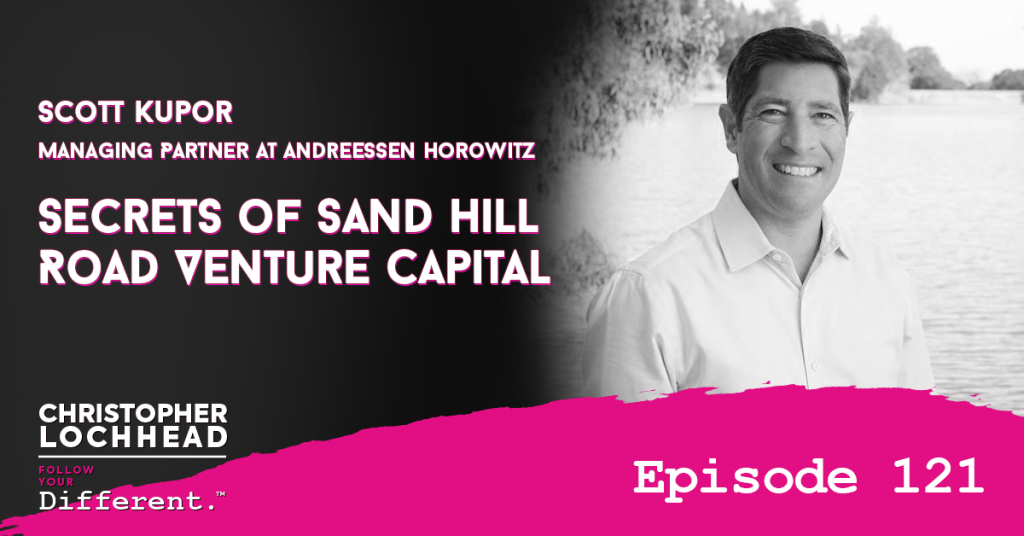
Podcast: Play in new window | Download (Duration: 1:01:29 — 84.5MB) | Embed
Subscribe: Apple Podcasts | Spotify | Pandora | RSS | More
In another riveting episode, Scott Kupor, the managing partner of one of the highest-profile VC on the planet over the last decade, Andreessen Horowitz, joins us today to discuss startups, how to get funded and a lot more! He is also the author of the book called Secrets of Sand Hill Road: Venture Capital and How to Get It.“Inside Baseball”
Scott addressed the common issue of “inside baseball” between entrepreneurs and VCs. He shares that there is no reason why questions shouldn’t be answered and that VCs should reach out to entrepreneurs.“People don’t understand why decisions are made. I think that just leads to mistrust quite frankly between VCs and entrepreneurs.” – Scott KuporMoreover, Scott shares the reason why he wrote the book. He wanted to bridge the gap between VCs and entrepreneurs. Through this book, he answers several entrepreneur questions that previously were assumed to be understood, since they have done a lot of deals in the past.
Information Asymmetry
Scott discusses the idea about information asymmetry and how it results to one party benefitting at the expense of the other in those types of scenarios.“Capital is scarce and VCs have it. There was definitely a very different balance of power between entrepreneurs and VCs. There’s probably less incentive quite frankly for the VC. The biggest change, I think, in the last 10 yrs is, its as competitive as its ever been.” – Scott KuporMoney clearly a commodity in this business. For Scott, if VCs and entrepreneurs can level the playing field, he would enter into a relationship on a basis of actually understanding one another, knowing what motivates one another as it would definitely be a good place better place to start.
More From Scott
Aside from talking about Silicon Valley, Startups and how entrepreneurs could get funding, he shares his thoughts on the overall VC backed industry.“My personal view is—I’ve talked about this with people in DC publicly—the idea that more and more growth is happening in the private markets, while beneficial, selfishly for people like me, who get to, kind of monetize that growth. I don’t think its good for the country. I don’t think its good to not have companies going public at a reasonable stage where a broader cross-section of public market investors can actually enjoy the appreciation there.” – Scott KuporTo hear more about Secrets of Sand Hill Road Venture Capital and more information about Scott Kupor, Managing Partner at Andreessen Horowitz, download and listen to the episode.
Bio:
Scott Kupor is the managing partner at Andreessen Horowitz where he is responsible for all operational aspects of running the firm. He has been with the firm since its inception in 2009 and has overseen its rapid growth, from three employees to 150+ and from $300 million in assets under management to more than $10 billion. Prior to joining Andreessen Horowitz, Scott worked as vice president and general manager of Software-as-a-Service at Hewlett Packard. Scott joined HP in 2007 as part of the Opsware acquisition, where he was senior vice president of Customer Solutions. In this role, he had global responsibility for customer interaction, including professional services, technical pre-sales, and customer support. Scott joined Opsware shortly after the company’s founding and held numerous executive management positions including vice president, financial planning and vice president, corporate development. In these roles, he led the company’s private financing activities as well as its initial public offering in 2001. Scott also started the company’s Asia Pacific operations and led the execution of the company’s multiple acquisitions. Prior to Opsware, Scott represented software companies in both financing and mergers and acquisitions transactions at Credit Suisse First Boston and Lehman Brothers. He graduated Phi Beta Kappa from Stanford University with a bachelor’s degree in public policy with honors and distinction. Scott also holds a law degree with distinction from Stanford University and is a member of the State Bar of California. Scott is chairman of the board of Genesys Works; cofounder and co-director of the Stanford Venture Capital Director’s College; co-founder and co-director of the Stanford Rock Center’s Guide to Venture-Backed Board Membership; Executive in Residence at Haas School of Business and Boalt School of Law; and a Lecturer at Stanford Law School. He is vice-chair of the investment committee of St. Jude’s Children’s Cancer Research Hospital and also serves as a member of the investment committees for Stanford Medical Center, the Silicon Valley Community Foundation, and Lick Wilmerding High School. Scott served as Chairman of the Board of the National Venture Capital Association (2017-2018). He is the author of the national bestselling book Secrets of Sand Hill Road: Venture Capital and How to Get It, published by Portfolio, a division of Penguin.Links:
Linkedin: Scott Kupor Twitter: @skupor Podcast: a16z We hope you enjoyed this episode of Follow Your Different™! Christopher loves hearing from his listeners. Feel free to email him, connect on Facebook, Twitter, Instagram and subscribe on iTunes! Get amazing, different stories on business, marketing, and life. Subscribe to our newsletter The Difference.115 Heidi Roizen Silicon Valley Legend
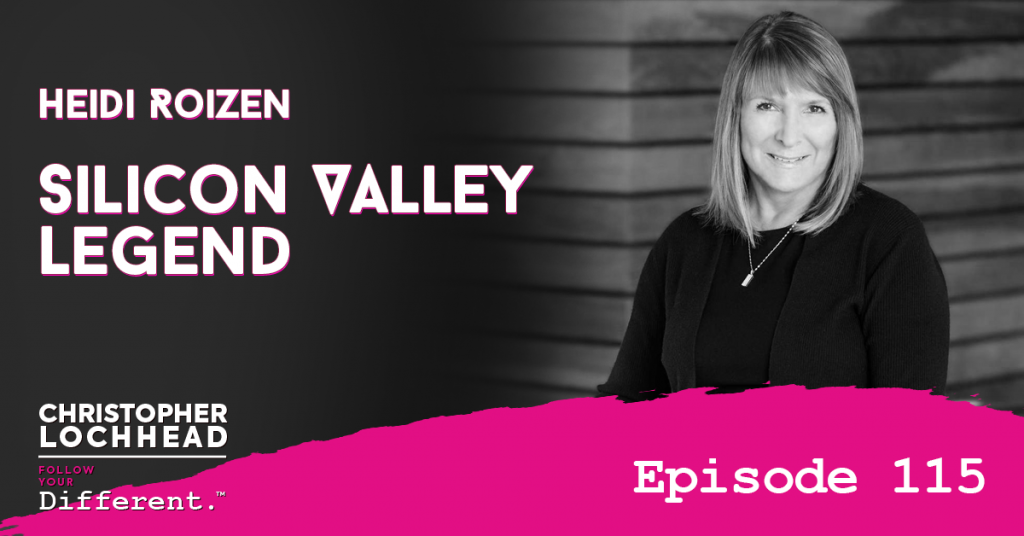
Podcast: Play in new window | Download (Duration: 1:06:50 — 93.1MB) | Embed
Subscribe: Apple Podcasts | Spotify | Pandora | RSS | More
Today’s guest is none other than Silicon Valley Legend, Heidi Roizen. She is an accomplished, Entrepreneur, former head of developer relations at Apple and now, a legendary VC. She shares with us why today is the Golden Era for entrepreneurship, how any company is literally a tech company and more about VC-backed company, Memphis Meats.
Silicon Valley’s Greatest Connector
The Financial Women of San Francisco honored Heidi as Financial Woman of the Year in 2018. She is also dubbed as “Silicon Valley’s Greatest Connector.” She is currently sits on the board of companies such as Zoox, Planet, Memphis Meats, HelixRE and DMGT.
“I talk about the fact that there should be more women entrepreneurs and there should be more women venture capitalists and diversity. Not just gender diversity but other diversity and I try to support that through my actions. I think it’s appropriate given my role in Silicon Valley. If I have an opinion about that, I should be vocal about that.” – Heidi Roizen
Other than these achievements, Heidi is a self-proclaimed animal lover. She adopted several dogs from the shelter, which she fondly shares in her social media.
Golden Era of Entrepreneurship
Heidi describes the market as a seller’s market when it comes to early-stage equity. There are a lot of sources of capital in the market, its very competitive. She enumerates all the positive assets entrepreneurs have in today’s world.
“There’s just so many different avenues for funding. There are so many tech breakthroughs that can be built upon, whether that is networking or processing power, sensors, devices, GPS, next-gen VR technologies, ubiquitous platforms. When you think about the kinds of businesses you can start today for pennies, which costs hundreds of thousands of dollars in the past.” – Heidi Roizen
The only negative she can mention is about competition, as she believes everyone else can also solve many big, interesting problems. Additionally, she mentions why companies nowadays are considered tech companies.
“I do think it’s interesting today is, every company is a technology company, right? For the most part, how they interact with the customers, how they distribute their products, how they garner feedback, how they handle customer service, tech support, logistics, supply chain, internally, HR systems—every company is deep in technology now.” – Heidi Roizen
Memphis Meats. Cell-based Meat
Heidi shares more about Memphis Meats and why she believes there is a huge growth potential for cell-based meat. First, she discusses how meat is inefficient to produce: from breeding to feeding to slaughtering and distribution to markets. Not only does it requires more resources, such as land and water use, it is also highly prone to contamination.
“The great thing about being a venture capitalist is, we don’t have to actually invent this stuff. There are really awesome entrepreneurs that are way smarter than we are who come up with these ideas. We just have to make sure they want to come to talk to us, and that we can validate sufficiently what they are doing through our own research learning.” – Heidi Roizen
To hear more about legendary Silicon Valley stories of Heidi Roizen, download and listen to the episode.
Bio:
Heidi represents the voice of the entrepreneur, having been one herself.
But she also represents the voice of the user, as those are the roots that led her to start a company in the first place.
She is on the boards of directors of Zoox, Planet, Memphis Meats, HelixRE and DMGT (LSE:DMGT.)
After Heidi earned her undergraduate and MBA degrees from Stanford, she co-founded T/Maker, where she served as CEO for over a decade through its acquisition by Deluxe Corporate in 1994. Next, she joined Apple as VP of Worldwide Developer Relations, and from there, Mobius Venture Capital.
She’s been named to the Corporate Board Member’s “Top 50 Women in Tech” list and Hot Topics’ Top 100 Women in Tech.
In 2018, Heidi was named the Financial Woman of the Year by the Financial Women of San Francisco.
She has also earned the Forum for Women Entrepreneurs and Executives Annual Achievement Award, among other accolades.
Heidi currently holds two leadership positions at Stanford University.
She co-leads the Threshold Venture Fellows in the Management Science and Engineering department at Stanford. She is also a member of the advisory council of Stanford’s Institute for Human-Centered Artificial Intelligence.
Links:
Silicon Valley’s Greatest Connector
Financial Women of San Francisco Name Heidi Roizen 2018 Financial Woman of the Year
We hope you enjoyed this episode of Follow Your Different™! Christopher loves hearing from his listeners. Feel free to email him, connect on Facebook, Twitter, Instagram and subscribe on iTunes! Get amazing, different stories on business, marketing, and life. Subscribe to our newsletter The Difference.
098 Build a legendary Board of Directors w/ Coco Brown
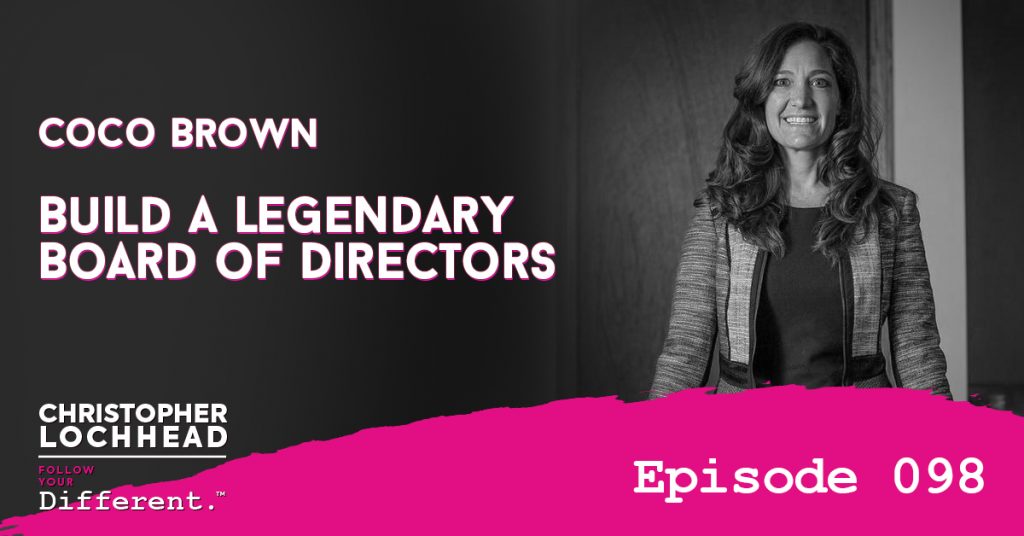
Podcast: Play in new window | Download (Duration: 1:01:30 — 56.5MB) | Embed
Subscribe: Apple Podcasts | Spotify | Pandora | RSS | More
In this episode, the CEO of Athena Alliance Coco Brown talks about how to build a legendary board of directors. Coco is an entrepreneur and an advocate for women. She tells us why boards need to have fresh talents and why they need diversity on skills and people. Also, she shares why the old model of creating a board is worn out.
The Athena Alliance
Coco Brown is the CEO of Athena Alliance. It is a global community of women business leaders, committed to driving diversity on company boards and developing new women leaders.
“We’re essentially bringing the top-tier women together in a digital ecosystem that provides us a lot of opportunities for them across disciplines.” – Coco Brown
Coco describes the community as in-part-Linkedin — with a portion of coaching and networking — and in-part-Bumble, because of matchmaking activities.
Male CEOs and The Outdated Board of Directors
Athena Alliance serves as an agency. The group is in contact with male CEOs who wish to expand their network with women.
Coco further shares with Christopher how outdated most companies are, in terms of the composition of their Board of Directors. In the past, the board is ultimately responsible for long term shareholder. Oftentimes, it is the reason why CEOs tend to stay long in their position, up until retirement.
“The board room needs a lot more empathy, connection, communication and understanding of the marketplace. If you look at the old board — seated with former CEOs and financial experts — the average age is 63, the average tenure is 8 1/2 years.” – Coco Brown
Building A Legendary Board
In the past, the committees are largely about CEO compensation, equities, and succession. Historically, committee topics are financials or risks. In the new world, these financial experts try to squeeze in other pressing corporate issues into those committees.
“So you’re starting to see this need for a much wider range of skills set in the board room. People who understand consumers. So good market strategists and leaders.” – Coco Brown
Moreover, she suggested to bring in more sets of people in their 30s or 40s. Ideally, she suggests contemporary professionals who are experienced with the operations.
To hear more about building a legendary Board of Directors, and more relevant information about Coco Brown, download and listen to the episode.
Bio:
Coco Brown leads “change and transformation.” She is responsible for accelerating multimillion-dollar growth through vision, strategy, technology, and people leadership.
She held leadership roles including CEO, COO, President, board member, and advisor—partnering with F1000 companies, start-ups, and nonprofits. Through her leadership, she has delivered successful outcomes for Apple, Cisco, eBay, Facebook, Silicon Valley Bank, and many others.
Currently, she is the founder, CEO, and board member of The Athena Alliance. The company is a game-changing executive firm helping to position the top 10% of executive women for advancement and board opportunities.
Since founding Athena in the Spring of 2016, she has led the organization to a network of over 1000 C-Level women, VCs, and CEOs from over 150 companies. These companies include Accenture, Cisco, Microsoft, Intuit, Autodesk, and Alphabet / Google.
Within two years, we have overseen 20 board placements and have secured $2 million in income through corporate and investor service offerings.
Links:
We hope you enjoyed this episode of Follow Your Different™! Christopher loves hearing from his listeners. Feel free to email him, connect on Facebook, Twitter, Instagram and subscribe on iTunes!
089 Entrepreneurs: Know the Difference Between “Craft Venture Capitalists” & Wall St VCs
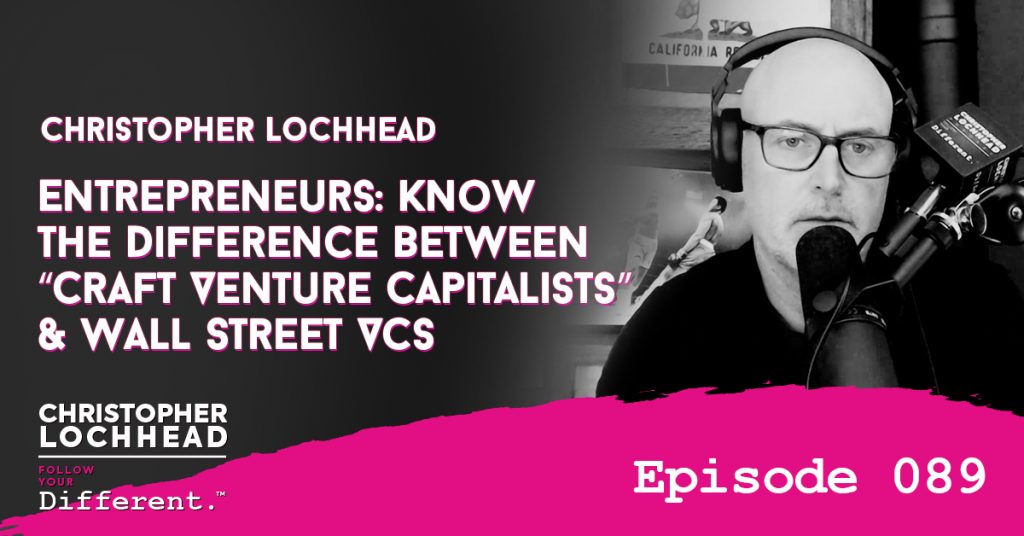
Podcast: Play in new window | Download (Duration: 7:58 — 7.5MB) | Embed
Subscribe: Apple Podcasts | Spotify | Pandora | RSS | More
In this episode, Christopher Lochhead explores the distinction between Craft Venture Capitalists and Wall Street Venture Capitalists (VCs) and why is it very important for entrepreneurs to know the difference.
This is a special episode for entrepreneurs who are contemplating on raising funds from VCs.
The Power of Venture-backed startups
In a study published by Brookings, they claimed that “in recent decades Venture Capital (VC) has generated more economic and employment growth in the U.S. than any other investment sector. Further, venture-backed startups make up 0.2% of GDP, in terms of investment and they deliver an astonishing 21% of U.S. GDP
“Venture-backed startup entrepreneurs who seek VC, produce an extraordinary outcome, not just for themselves, their people, customers, investors but for the US economy overall.” – Christopher Lochhead
So, What’s The Issue?
Lochhead frankly discussed a disturbing trend in Silicon Valley over the last 15 years or so. The emergence of Wall Street type VCs — who are principally focused on value extraction. This is in opposition to “Craft VCs” who helped build Silicon Valley.
“Here’s the problem: the wall street types come in and they whisper sweetly into the ears of entrepreneurs and they convince them to delay going public. They convince them to make money with them.” – Christopher Lochhead
Lochhead clarified that these folks are focused on value extraction from the entrepreneurs. These Wall Street VCs impose terms and conditions which are often fairly punitive to entrepreneurs and to employees.
Entrepreneurs: Pay Close Attention!
Lochhead forewarns entrepreneurs who are considering Wall Street VCs versus Craft VCs. First and foremost, Craft VCs prioritizes relationship with the founder and the employees. They focus on providing experience, as they are former entrepreneurs themselves.
“Craft VCs partner to create value with entrepreneurs and the terms and conditions reflect this over time. The wall street folks? They just wanna come in, make money and frankly, they don’t care who else is successful. They don’t care who else they hurt, they’re in for themselves.” – Christopher Lochhead
To hear more about the difference between craft VCs and Wall Street VCs, download and listen to the episode.
Bio:
Christopher Lochhead is a Top 25 podcaster and #1 Amazon bestselling co-author of books: Niche Down and Play Bigger.
He has been an advisor to over 50 venture-backed startups; a former three-time Silicon Valley public company CMO and an entrepreneur.
Furthermore, he has been called “one of the best minds in marketing” by The Marketing Journal, a “Human Exclamation Point” by Fast Company, a “quasar” by NBA legend Bill Walton and “off-putting to some” by The Economist.
In addition, he served as a chief marketing officer of software juggernaut Mercury Interactive. Hewlett-Packard acquired the company in 2006 for $4.5 billion.
He also co-founded the marketing consulting firm LOCHHEAD; was the founding CMO of Internet consulting firm Scient, and served as head of marketing at the CRM software firm Vantive.
Links:
Brookings – As the venture capital game gets bigger, the Midwest keeps missing out
We hope you enjoyed this episode of Follow Your Different™! Christopher loves hearing from his listeners. Feel free to email him, connect on Facebook, Twitter, Instagram and subscribe on iTunes!

